Corporate Social Responsibility Analysis of Woolworths Group Report
VerifiedAdded on 2023/01/24
|12
|3335
|76
Report
AI Summary
This report provides an executive summary and in-depth analysis of the Corporate Social Responsibility (CSR) disclosures of Woolworths Group, an Australian retail giant. The report evaluates Woolworths' CSR practices, particularly concerning its liquor retailing, which has faced criticism for potential negative impacts. The analysis utilizes stakeholder and legitimacy theories to assess the effectiveness of Woolworths' CSR disclosures in addressing issues such as liquor sales, land clearing, and the potential use of child labor within its supply chain. The report concludes that while Woolworths' disclosures effectively address liquor retailing concerns, improvements are needed regarding sustainable sourcing practices, especially concerning land clearing and labor practices within its supply chain. The report offers recommendations at both corporate and regulatory levels to enhance Woolworths' CSR reporting and practices.
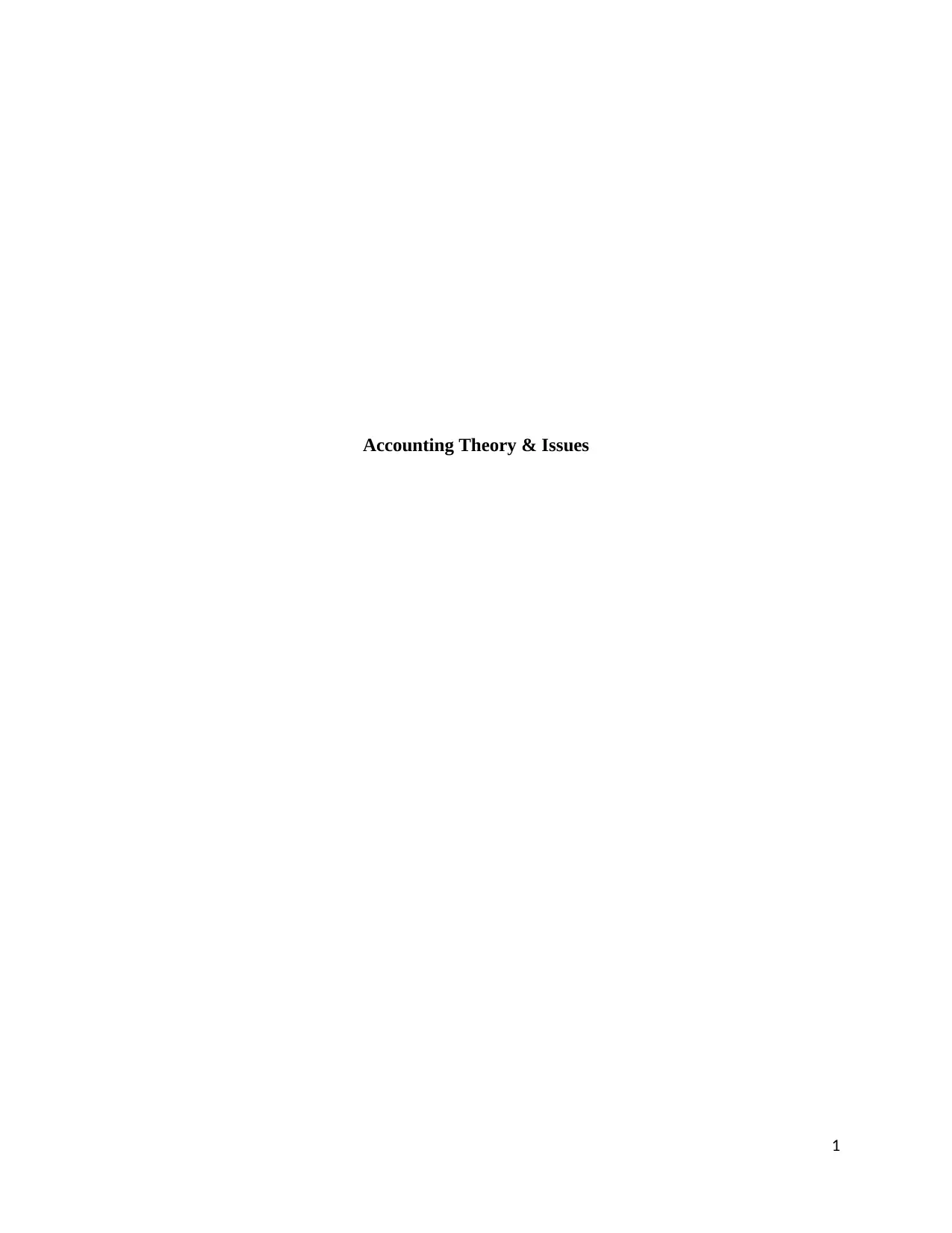
Accounting Theory & Issues
1
1
Paraphrase This Document
Need a fresh take? Get an instant paraphrase of this document with our AI Paraphraser
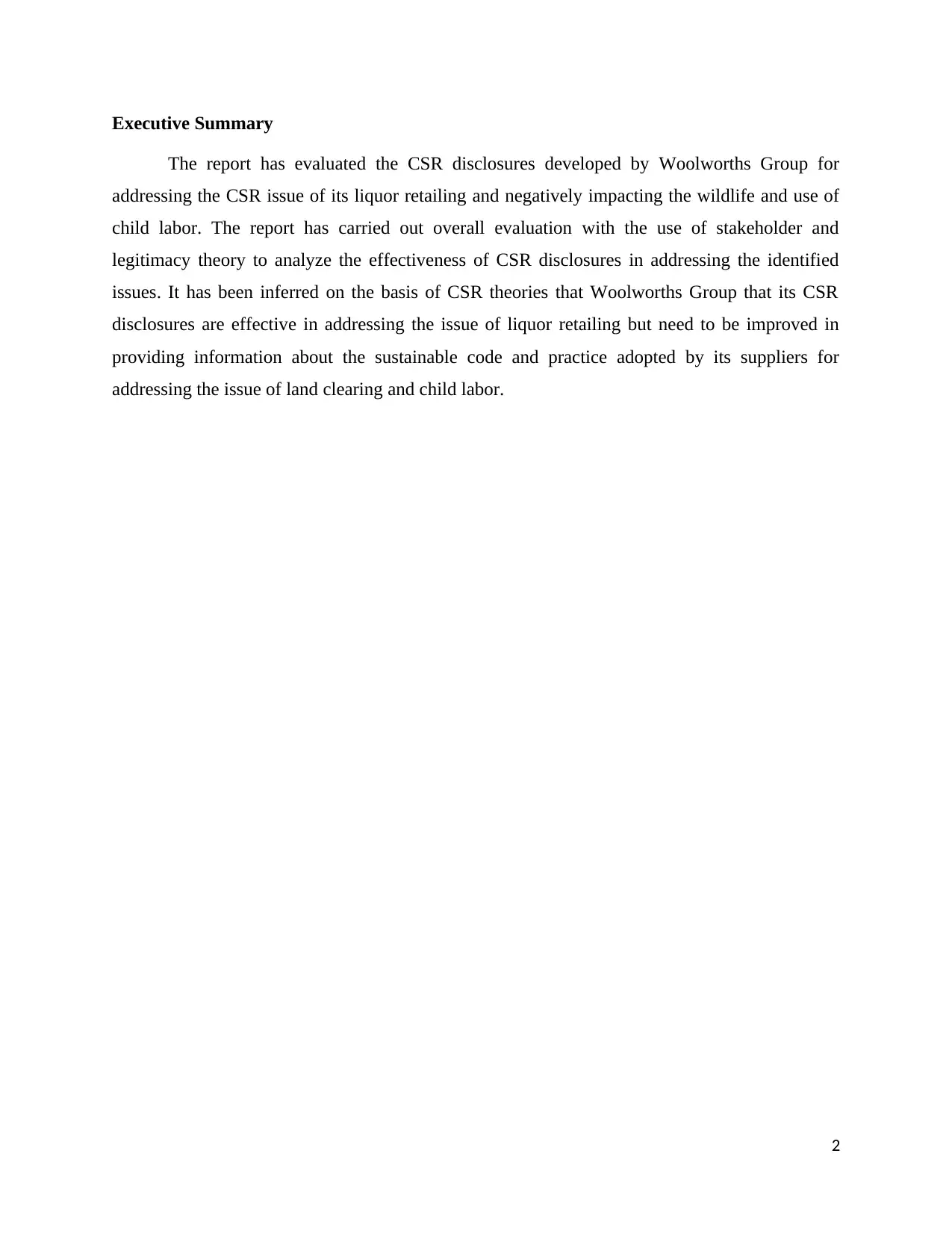
Executive Summary
The report has evaluated the CSR disclosures developed by Woolworths Group for
addressing the CSR issue of its liquor retailing and negatively impacting the wildlife and use of
child labor. The report has carried out overall evaluation with the use of stakeholder and
legitimacy theory to analyze the effectiveness of CSR disclosures in addressing the identified
issues. It has been inferred on the basis of CSR theories that Woolworths Group that its CSR
disclosures are effective in addressing the issue of liquor retailing but need to be improved in
providing information about the sustainable code and practice adopted by its suppliers for
addressing the issue of land clearing and child labor.
2
The report has evaluated the CSR disclosures developed by Woolworths Group for
addressing the CSR issue of its liquor retailing and negatively impacting the wildlife and use of
child labor. The report has carried out overall evaluation with the use of stakeholder and
legitimacy theory to analyze the effectiveness of CSR disclosures in addressing the identified
issues. It has been inferred on the basis of CSR theories that Woolworths Group that its CSR
disclosures are effective in addressing the issue of liquor retailing but need to be improved in
providing information about the sustainable code and practice adopted by its suppliers for
addressing the issue of land clearing and child labor.
2
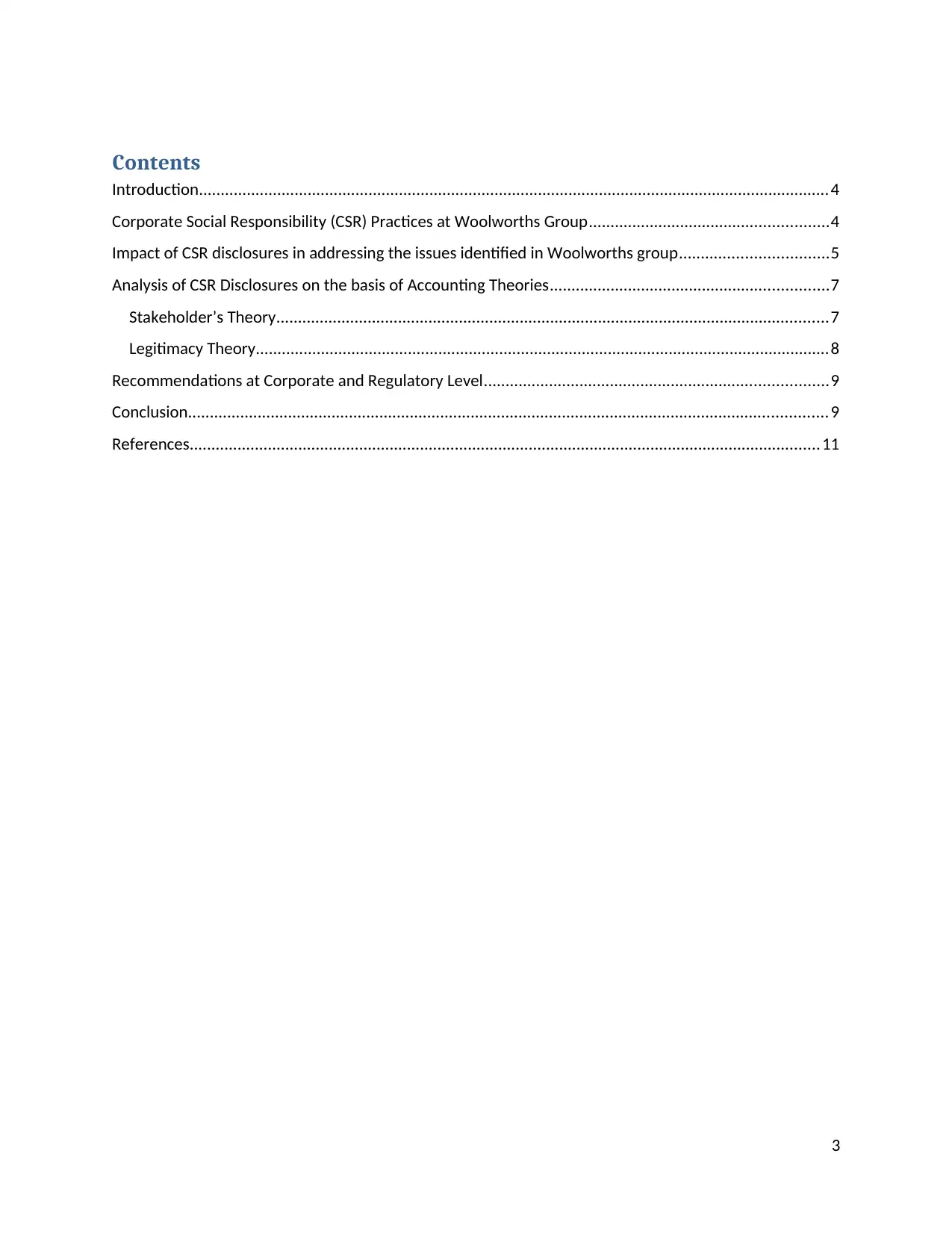
Contents
Introduction.................................................................................................................................................4
Corporate Social Responsibility (CSR) Practices at Woolworths Group.......................................................4
Impact of CSR disclosures in addressing the issues identified in Woolworths group..................................5
Analysis of CSR Disclosures on the basis of Accounting Theories................................................................7
Stakeholder’s Theory...............................................................................................................................7
Legitimacy Theory....................................................................................................................................8
Recommendations at Corporate and Regulatory Level...............................................................................9
Conclusion...................................................................................................................................................9
References.................................................................................................................................................11
3
Introduction.................................................................................................................................................4
Corporate Social Responsibility (CSR) Practices at Woolworths Group.......................................................4
Impact of CSR disclosures in addressing the issues identified in Woolworths group..................................5
Analysis of CSR Disclosures on the basis of Accounting Theories................................................................7
Stakeholder’s Theory...............................................................................................................................7
Legitimacy Theory....................................................................................................................................8
Recommendations at Corporate and Regulatory Level...............................................................................9
Conclusion...................................................................................................................................................9
References.................................................................................................................................................11
3
⊘ This is a preview!⊘
Do you want full access?
Subscribe today to unlock all pages.

Trusted by 1+ million students worldwide
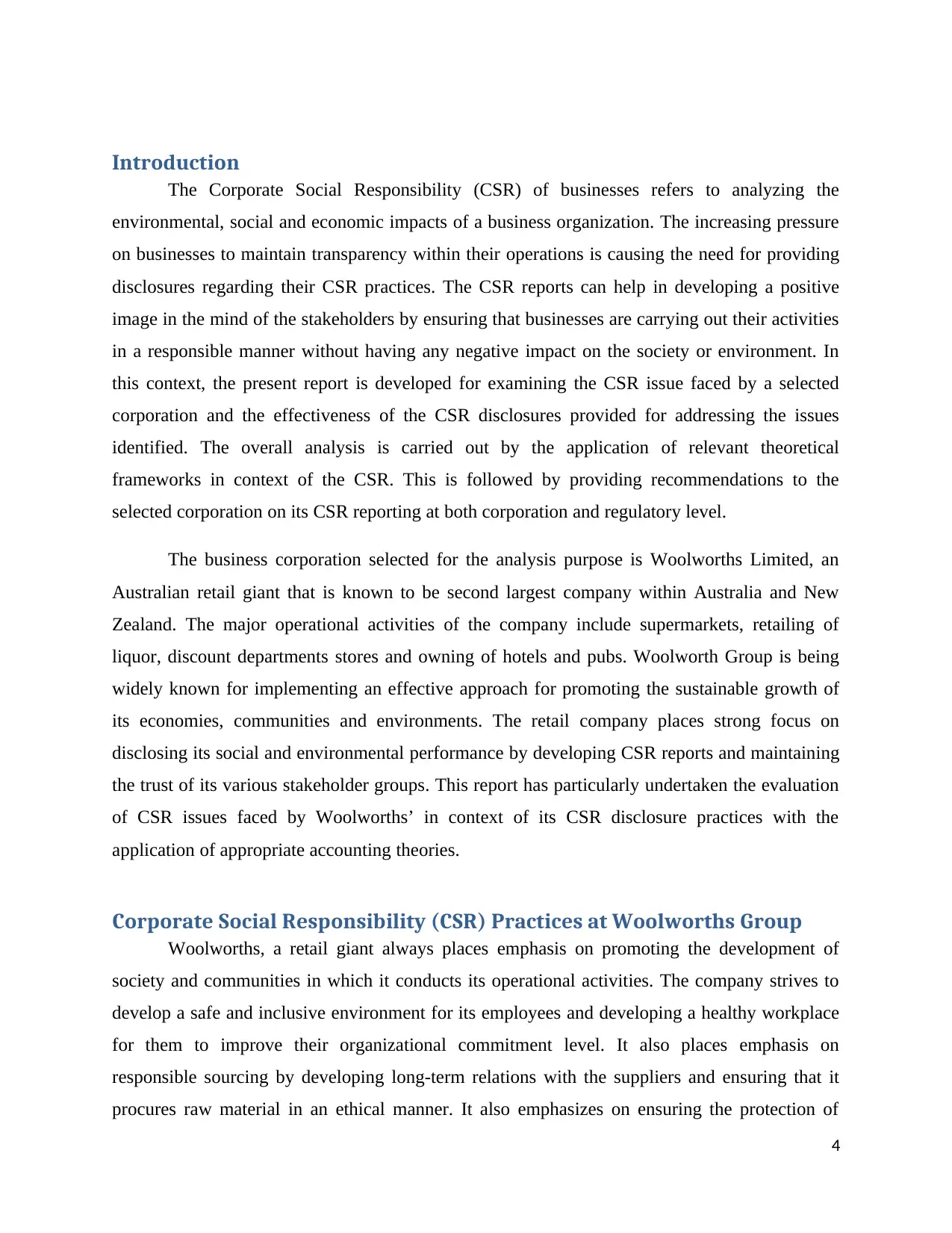
Introduction
The Corporate Social Responsibility (CSR) of businesses refers to analyzing the
environmental, social and economic impacts of a business organization. The increasing pressure
on businesses to maintain transparency within their operations is causing the need for providing
disclosures regarding their CSR practices. The CSR reports can help in developing a positive
image in the mind of the stakeholders by ensuring that businesses are carrying out their activities
in a responsible manner without having any negative impact on the society or environment. In
this context, the present report is developed for examining the CSR issue faced by a selected
corporation and the effectiveness of the CSR disclosures provided for addressing the issues
identified. The overall analysis is carried out by the application of relevant theoretical
frameworks in context of the CSR. This is followed by providing recommendations to the
selected corporation on its CSR reporting at both corporation and regulatory level.
The business corporation selected for the analysis purpose is Woolworths Limited, an
Australian retail giant that is known to be second largest company within Australia and New
Zealand. The major operational activities of the company include supermarkets, retailing of
liquor, discount departments stores and owning of hotels and pubs. Woolworth Group is being
widely known for implementing an effective approach for promoting the sustainable growth of
its economies, communities and environments. The retail company places strong focus on
disclosing its social and environmental performance by developing CSR reports and maintaining
the trust of its various stakeholder groups. This report has particularly undertaken the evaluation
of CSR issues faced by Woolworths’ in context of its CSR disclosure practices with the
application of appropriate accounting theories.
Corporate Social Responsibility (CSR) Practices at Woolworths Group
Woolworths, a retail giant always places emphasis on promoting the development of
society and communities in which it conducts its operational activities. The company strives to
develop a safe and inclusive environment for its employees and developing a healthy workplace
for them to improve their organizational commitment level. It also places emphasis on
responsible sourcing by developing long-term relations with the suppliers and ensuring that it
procures raw material in an ethical manner. It also emphasizes on ensuring the protection of
4
The Corporate Social Responsibility (CSR) of businesses refers to analyzing the
environmental, social and economic impacts of a business organization. The increasing pressure
on businesses to maintain transparency within their operations is causing the need for providing
disclosures regarding their CSR practices. The CSR reports can help in developing a positive
image in the mind of the stakeholders by ensuring that businesses are carrying out their activities
in a responsible manner without having any negative impact on the society or environment. In
this context, the present report is developed for examining the CSR issue faced by a selected
corporation and the effectiveness of the CSR disclosures provided for addressing the issues
identified. The overall analysis is carried out by the application of relevant theoretical
frameworks in context of the CSR. This is followed by providing recommendations to the
selected corporation on its CSR reporting at both corporation and regulatory level.
The business corporation selected for the analysis purpose is Woolworths Limited, an
Australian retail giant that is known to be second largest company within Australia and New
Zealand. The major operational activities of the company include supermarkets, retailing of
liquor, discount departments stores and owning of hotels and pubs. Woolworth Group is being
widely known for implementing an effective approach for promoting the sustainable growth of
its economies, communities and environments. The retail company places strong focus on
disclosing its social and environmental performance by developing CSR reports and maintaining
the trust of its various stakeholder groups. This report has particularly undertaken the evaluation
of CSR issues faced by Woolworths’ in context of its CSR disclosure practices with the
application of appropriate accounting theories.
Corporate Social Responsibility (CSR) Practices at Woolworths Group
Woolworths, a retail giant always places emphasis on promoting the development of
society and communities in which it conducts its operational activities. The company strives to
develop a safe and inclusive environment for its employees and developing a healthy workplace
for them to improve their organizational commitment level. It also places emphasis on
responsible sourcing by developing long-term relations with the suppliers and ensuring that it
procures raw material in an ethical manner. It also emphasizes on ensuring the protection of
4
Paraphrase This Document
Need a fresh take? Get an instant paraphrase of this document with our AI Paraphraser
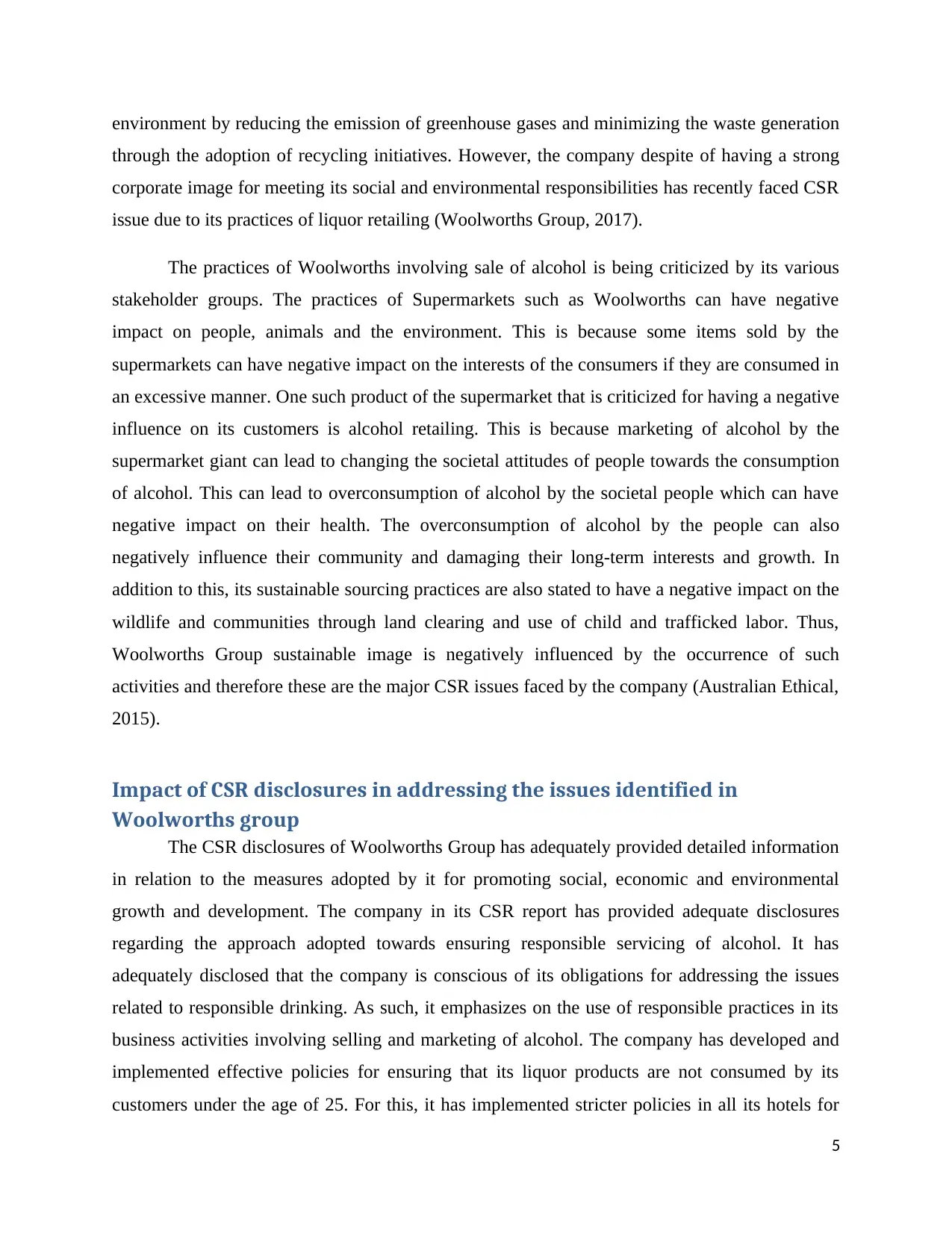
environment by reducing the emission of greenhouse gases and minimizing the waste generation
through the adoption of recycling initiatives. However, the company despite of having a strong
corporate image for meeting its social and environmental responsibilities has recently faced CSR
issue due to its practices of liquor retailing (Woolworths Group, 2017).
The practices of Woolworths involving sale of alcohol is being criticized by its various
stakeholder groups. The practices of Supermarkets such as Woolworths can have negative
impact on people, animals and the environment. This is because some items sold by the
supermarkets can have negative impact on the interests of the consumers if they are consumed in
an excessive manner. One such product of the supermarket that is criticized for having a negative
influence on its customers is alcohol retailing. This is because marketing of alcohol by the
supermarket giant can lead to changing the societal attitudes of people towards the consumption
of alcohol. This can lead to overconsumption of alcohol by the societal people which can have
negative impact on their health. The overconsumption of alcohol by the people can also
negatively influence their community and damaging their long-term interests and growth. In
addition to this, its sustainable sourcing practices are also stated to have a negative impact on the
wildlife and communities through land clearing and use of child and trafficked labor. Thus,
Woolworths Group sustainable image is negatively influenced by the occurrence of such
activities and therefore these are the major CSR issues faced by the company (Australian Ethical,
2015).
Impact of CSR disclosures in addressing the issues identified in
Woolworths group
The CSR disclosures of Woolworths Group has adequately provided detailed information
in relation to the measures adopted by it for promoting social, economic and environmental
growth and development. The company in its CSR report has provided adequate disclosures
regarding the approach adopted towards ensuring responsible servicing of alcohol. It has
adequately disclosed that the company is conscious of its obligations for addressing the issues
related to responsible drinking. As such, it emphasizes on the use of responsible practices in its
business activities involving selling and marketing of alcohol. The company has developed and
implemented effective policies for ensuring that its liquor products are not consumed by its
customers under the age of 25. For this, it has implemented stricter policies in all its hotels for
5
through the adoption of recycling initiatives. However, the company despite of having a strong
corporate image for meeting its social and environmental responsibilities has recently faced CSR
issue due to its practices of liquor retailing (Woolworths Group, 2017).
The practices of Woolworths involving sale of alcohol is being criticized by its various
stakeholder groups. The practices of Supermarkets such as Woolworths can have negative
impact on people, animals and the environment. This is because some items sold by the
supermarkets can have negative impact on the interests of the consumers if they are consumed in
an excessive manner. One such product of the supermarket that is criticized for having a negative
influence on its customers is alcohol retailing. This is because marketing of alcohol by the
supermarket giant can lead to changing the societal attitudes of people towards the consumption
of alcohol. This can lead to overconsumption of alcohol by the societal people which can have
negative impact on their health. The overconsumption of alcohol by the people can also
negatively influence their community and damaging their long-term interests and growth. In
addition to this, its sustainable sourcing practices are also stated to have a negative impact on the
wildlife and communities through land clearing and use of child and trafficked labor. Thus,
Woolworths Group sustainable image is negatively influenced by the occurrence of such
activities and therefore these are the major CSR issues faced by the company (Australian Ethical,
2015).
Impact of CSR disclosures in addressing the issues identified in
Woolworths group
The CSR disclosures of Woolworths Group has adequately provided detailed information
in relation to the measures adopted by it for promoting social, economic and environmental
growth and development. The company in its CSR report has provided adequate disclosures
regarding the approach adopted towards ensuring responsible servicing of alcohol. It has
adequately disclosed that the company is conscious of its obligations for addressing the issues
related to responsible drinking. As such, it emphasizes on the use of responsible practices in its
business activities involving selling and marketing of alcohol. The company has developed and
implemented effective policies for ensuring that its liquor products are not consumed by its
customers under the age of 25. For this, it has implemented stricter policies in all its hotels for
5
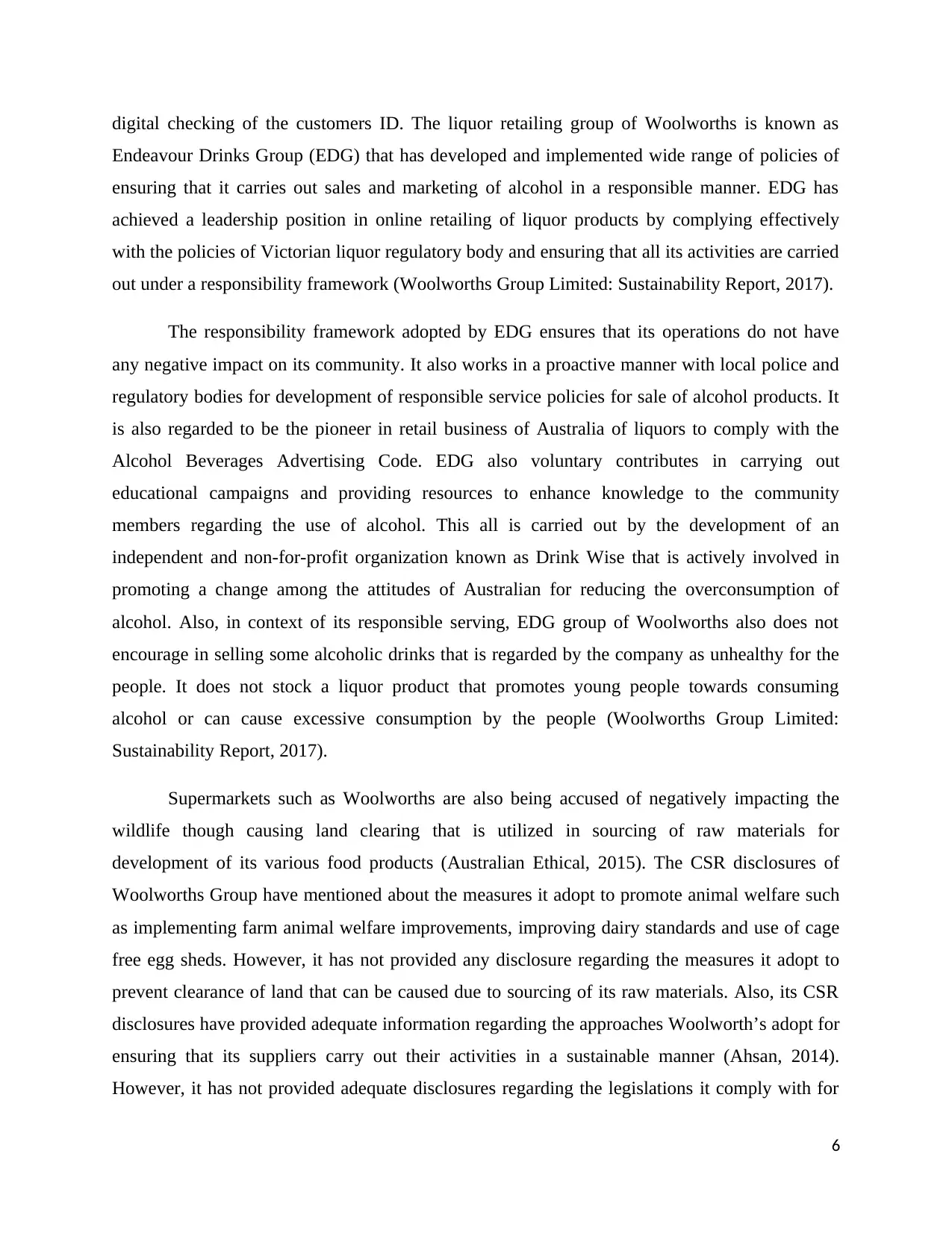
digital checking of the customers ID. The liquor retailing group of Woolworths is known as
Endeavour Drinks Group (EDG) that has developed and implemented wide range of policies of
ensuring that it carries out sales and marketing of alcohol in a responsible manner. EDG has
achieved a leadership position in online retailing of liquor products by complying effectively
with the policies of Victorian liquor regulatory body and ensuring that all its activities are carried
out under a responsibility framework (Woolworths Group Limited: Sustainability Report, 2017).
The responsibility framework adopted by EDG ensures that its operations do not have
any negative impact on its community. It also works in a proactive manner with local police and
regulatory bodies for development of responsible service policies for sale of alcohol products. It
is also regarded to be the pioneer in retail business of Australia of liquors to comply with the
Alcohol Beverages Advertising Code. EDG also voluntary contributes in carrying out
educational campaigns and providing resources to enhance knowledge to the community
members regarding the use of alcohol. This all is carried out by the development of an
independent and non-for-profit organization known as Drink Wise that is actively involved in
promoting a change among the attitudes of Australian for reducing the overconsumption of
alcohol. Also, in context of its responsible serving, EDG group of Woolworths also does not
encourage in selling some alcoholic drinks that is regarded by the company as unhealthy for the
people. It does not stock a liquor product that promotes young people towards consuming
alcohol or can cause excessive consumption by the people (Woolworths Group Limited:
Sustainability Report, 2017).
Supermarkets such as Woolworths are also being accused of negatively impacting the
wildlife though causing land clearing that is utilized in sourcing of raw materials for
development of its various food products (Australian Ethical, 2015). The CSR disclosures of
Woolworths Group have mentioned about the measures it adopt to promote animal welfare such
as implementing farm animal welfare improvements, improving dairy standards and use of cage
free egg sheds. However, it has not provided any disclosure regarding the measures it adopt to
prevent clearance of land that can be caused due to sourcing of its raw materials. Also, its CSR
disclosures have provided adequate information regarding the approaches Woolworth’s adopt for
ensuring that its suppliers carry out their activities in a sustainable manner (Ahsan, 2014).
However, it has not provided adequate disclosures regarding the legislations it comply with for
6
Endeavour Drinks Group (EDG) that has developed and implemented wide range of policies of
ensuring that it carries out sales and marketing of alcohol in a responsible manner. EDG has
achieved a leadership position in online retailing of liquor products by complying effectively
with the policies of Victorian liquor regulatory body and ensuring that all its activities are carried
out under a responsibility framework (Woolworths Group Limited: Sustainability Report, 2017).
The responsibility framework adopted by EDG ensures that its operations do not have
any negative impact on its community. It also works in a proactive manner with local police and
regulatory bodies for development of responsible service policies for sale of alcohol products. It
is also regarded to be the pioneer in retail business of Australia of liquors to comply with the
Alcohol Beverages Advertising Code. EDG also voluntary contributes in carrying out
educational campaigns and providing resources to enhance knowledge to the community
members regarding the use of alcohol. This all is carried out by the development of an
independent and non-for-profit organization known as Drink Wise that is actively involved in
promoting a change among the attitudes of Australian for reducing the overconsumption of
alcohol. Also, in context of its responsible serving, EDG group of Woolworths also does not
encourage in selling some alcoholic drinks that is regarded by the company as unhealthy for the
people. It does not stock a liquor product that promotes young people towards consuming
alcohol or can cause excessive consumption by the people (Woolworths Group Limited:
Sustainability Report, 2017).
Supermarkets such as Woolworths are also being accused of negatively impacting the
wildlife though causing land clearing that is utilized in sourcing of raw materials for
development of its various food products (Australian Ethical, 2015). The CSR disclosures of
Woolworths Group have mentioned about the measures it adopt to promote animal welfare such
as implementing farm animal welfare improvements, improving dairy standards and use of cage
free egg sheds. However, it has not provided any disclosure regarding the measures it adopt to
prevent clearance of land that can be caused due to sourcing of its raw materials. Also, its CSR
disclosures have provided adequate information regarding the approaches Woolworth’s adopt for
ensuring that its suppliers carry out their activities in a sustainable manner (Ahsan, 2014).
However, it has not provided adequate disclosures regarding the legislations it comply with for
6
⊘ This is a preview!⊘
Do you want full access?
Subscribe today to unlock all pages.

Trusted by 1+ million students worldwide
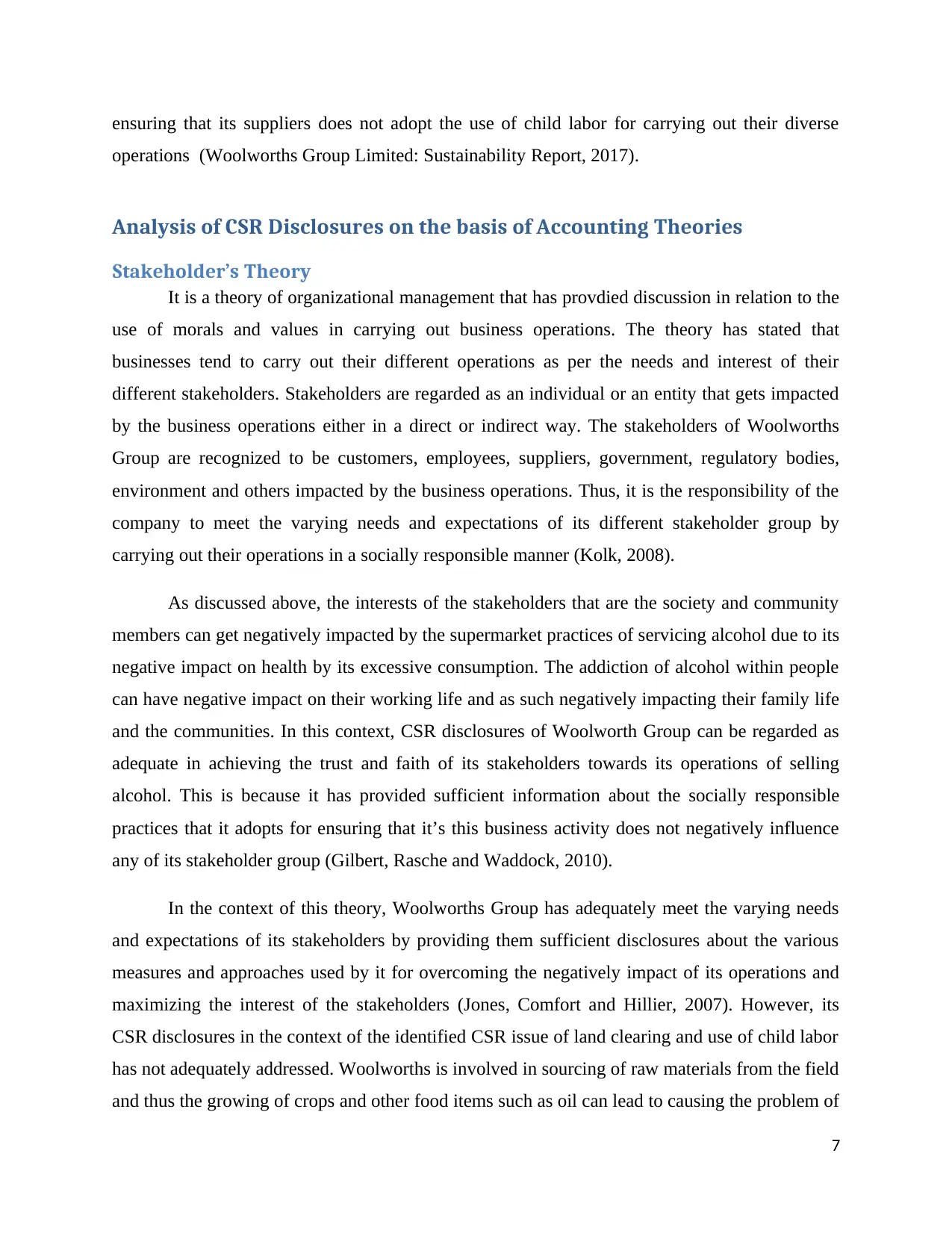
ensuring that its suppliers does not adopt the use of child labor for carrying out their diverse
operations (Woolworths Group Limited: Sustainability Report, 2017).
Analysis of CSR Disclosures on the basis of Accounting Theories
Stakeholder’s Theory
It is a theory of organizational management that has provdied discussion in relation to the
use of morals and values in carrying out business operations. The theory has stated that
businesses tend to carry out their different operations as per the needs and interest of their
different stakeholders. Stakeholders are regarded as an individual or an entity that gets impacted
by the business operations either in a direct or indirect way. The stakeholders of Woolworths
Group are recognized to be customers, employees, suppliers, government, regulatory bodies,
environment and others impacted by the business operations. Thus, it is the responsibility of the
company to meet the varying needs and expectations of its different stakeholder group by
carrying out their operations in a socially responsible manner (Kolk, 2008).
As discussed above, the interests of the stakeholders that are the society and community
members can get negatively impacted by the supermarket practices of servicing alcohol due to its
negative impact on health by its excessive consumption. The addiction of alcohol within people
can have negative impact on their working life and as such negatively impacting their family life
and the communities. In this context, CSR disclosures of Woolworth Group can be regarded as
adequate in achieving the trust and faith of its stakeholders towards its operations of selling
alcohol. This is because it has provided sufficient information about the socially responsible
practices that it adopts for ensuring that it’s this business activity does not negatively influence
any of its stakeholder group (Gilbert, Rasche and Waddock, 2010).
In the context of this theory, Woolworths Group has adequately meet the varying needs
and expectations of its stakeholders by providing them sufficient disclosures about the various
measures and approaches used by it for overcoming the negatively impact of its operations and
maximizing the interest of the stakeholders (Jones, Comfort and Hillier, 2007). However, its
CSR disclosures in the context of the identified CSR issue of land clearing and use of child labor
has not adequately addressed. Woolworths is involved in sourcing of raw materials from the field
and thus the growing of crops and other food items such as oil can lead to causing the problem of
7
operations (Woolworths Group Limited: Sustainability Report, 2017).
Analysis of CSR Disclosures on the basis of Accounting Theories
Stakeholder’s Theory
It is a theory of organizational management that has provdied discussion in relation to the
use of morals and values in carrying out business operations. The theory has stated that
businesses tend to carry out their different operations as per the needs and interest of their
different stakeholders. Stakeholders are regarded as an individual or an entity that gets impacted
by the business operations either in a direct or indirect way. The stakeholders of Woolworths
Group are recognized to be customers, employees, suppliers, government, regulatory bodies,
environment and others impacted by the business operations. Thus, it is the responsibility of the
company to meet the varying needs and expectations of its different stakeholder group by
carrying out their operations in a socially responsible manner (Kolk, 2008).
As discussed above, the interests of the stakeholders that are the society and community
members can get negatively impacted by the supermarket practices of servicing alcohol due to its
negative impact on health by its excessive consumption. The addiction of alcohol within people
can have negative impact on their working life and as such negatively impacting their family life
and the communities. In this context, CSR disclosures of Woolworth Group can be regarded as
adequate in achieving the trust and faith of its stakeholders towards its operations of selling
alcohol. This is because it has provided sufficient information about the socially responsible
practices that it adopts for ensuring that it’s this business activity does not negatively influence
any of its stakeholder group (Gilbert, Rasche and Waddock, 2010).
In the context of this theory, Woolworths Group has adequately meet the varying needs
and expectations of its stakeholders by providing them sufficient disclosures about the various
measures and approaches used by it for overcoming the negatively impact of its operations and
maximizing the interest of the stakeholders (Jones, Comfort and Hillier, 2007). However, its
CSR disclosures in the context of the identified CSR issue of land clearing and use of child labor
has not adequately addressed. Woolworths is involved in sourcing of raw materials from the field
and thus the growing of crops and other food items such as oil can lead to causing the problem of
7
Paraphrase This Document
Need a fresh take? Get an instant paraphrase of this document with our AI Paraphraser
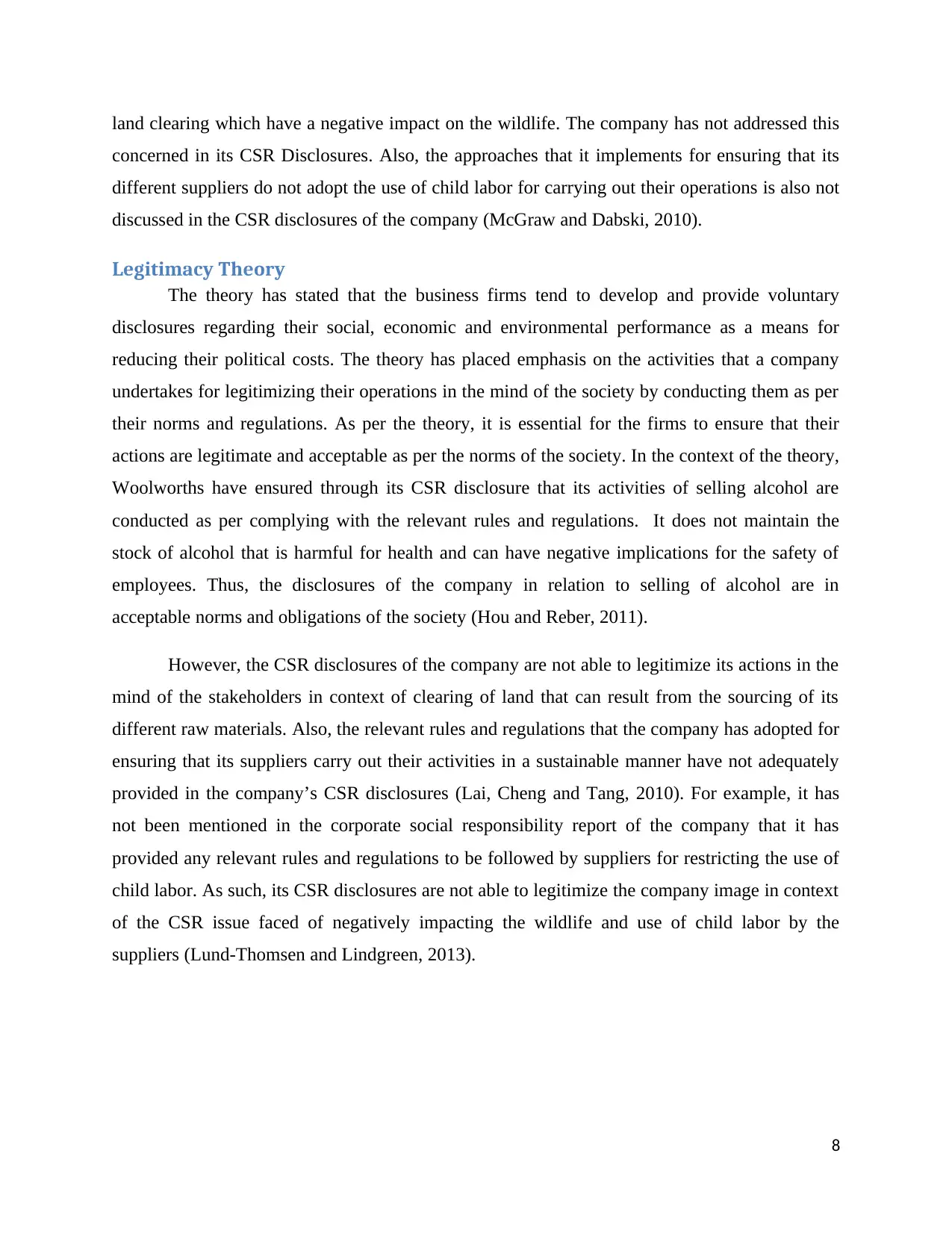
land clearing which have a negative impact on the wildlife. The company has not addressed this
concerned in its CSR Disclosures. Also, the approaches that it implements for ensuring that its
different suppliers do not adopt the use of child labor for carrying out their operations is also not
discussed in the CSR disclosures of the company (McGraw and Dabski, 2010).
Legitimacy Theory
The theory has stated that the business firms tend to develop and provide voluntary
disclosures regarding their social, economic and environmental performance as a means for
reducing their political costs. The theory has placed emphasis on the activities that a company
undertakes for legitimizing their operations in the mind of the society by conducting them as per
their norms and regulations. As per the theory, it is essential for the firms to ensure that their
actions are legitimate and acceptable as per the norms of the society. In the context of the theory,
Woolworths have ensured through its CSR disclosure that its activities of selling alcohol are
conducted as per complying with the relevant rules and regulations. It does not maintain the
stock of alcohol that is harmful for health and can have negative implications for the safety of
employees. Thus, the disclosures of the company in relation to selling of alcohol are in
acceptable norms and obligations of the society (Hou and Reber, 2011).
However, the CSR disclosures of the company are not able to legitimize its actions in the
mind of the stakeholders in context of clearing of land that can result from the sourcing of its
different raw materials. Also, the relevant rules and regulations that the company has adopted for
ensuring that its suppliers carry out their activities in a sustainable manner have not adequately
provided in the company’s CSR disclosures (Lai, Cheng and Tang, 2010). For example, it has
not been mentioned in the corporate social responsibility report of the company that it has
provided any relevant rules and regulations to be followed by suppliers for restricting the use of
child labor. As such, its CSR disclosures are not able to legitimize the company image in context
of the CSR issue faced of negatively impacting the wildlife and use of child labor by the
suppliers (Lund-Thomsen and Lindgreen, 2013).
8
concerned in its CSR Disclosures. Also, the approaches that it implements for ensuring that its
different suppliers do not adopt the use of child labor for carrying out their operations is also not
discussed in the CSR disclosures of the company (McGraw and Dabski, 2010).
Legitimacy Theory
The theory has stated that the business firms tend to develop and provide voluntary
disclosures regarding their social, economic and environmental performance as a means for
reducing their political costs. The theory has placed emphasis on the activities that a company
undertakes for legitimizing their operations in the mind of the society by conducting them as per
their norms and regulations. As per the theory, it is essential for the firms to ensure that their
actions are legitimate and acceptable as per the norms of the society. In the context of the theory,
Woolworths have ensured through its CSR disclosure that its activities of selling alcohol are
conducted as per complying with the relevant rules and regulations. It does not maintain the
stock of alcohol that is harmful for health and can have negative implications for the safety of
employees. Thus, the disclosures of the company in relation to selling of alcohol are in
acceptable norms and obligations of the society (Hou and Reber, 2011).
However, the CSR disclosures of the company are not able to legitimize its actions in the
mind of the stakeholders in context of clearing of land that can result from the sourcing of its
different raw materials. Also, the relevant rules and regulations that the company has adopted for
ensuring that its suppliers carry out their activities in a sustainable manner have not adequately
provided in the company’s CSR disclosures (Lai, Cheng and Tang, 2010). For example, it has
not been mentioned in the corporate social responsibility report of the company that it has
provided any relevant rules and regulations to be followed by suppliers for restricting the use of
child labor. As such, its CSR disclosures are not able to legitimize the company image in context
of the CSR issue faced of negatively impacting the wildlife and use of child labor by the
suppliers (Lund-Thomsen and Lindgreen, 2013).
8
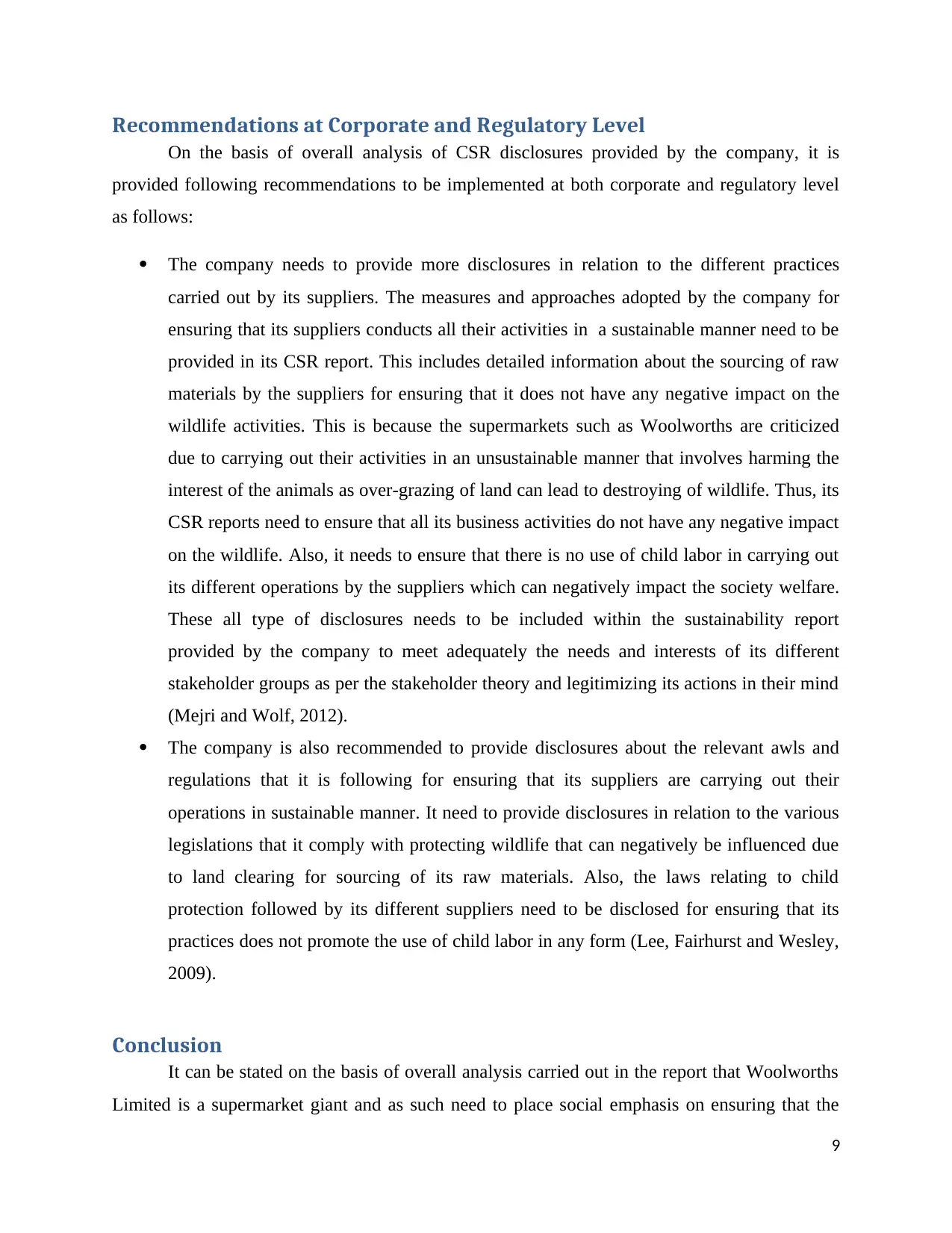
Recommendations at Corporate and Regulatory Level
On the basis of overall analysis of CSR disclosures provided by the company, it is
provided following recommendations to be implemented at both corporate and regulatory level
as follows:
The company needs to provide more disclosures in relation to the different practices
carried out by its suppliers. The measures and approaches adopted by the company for
ensuring that its suppliers conducts all their activities in a sustainable manner need to be
provided in its CSR report. This includes detailed information about the sourcing of raw
materials by the suppliers for ensuring that it does not have any negative impact on the
wildlife activities. This is because the supermarkets such as Woolworths are criticized
due to carrying out their activities in an unsustainable manner that involves harming the
interest of the animals as over-grazing of land can lead to destroying of wildlife. Thus, its
CSR reports need to ensure that all its business activities do not have any negative impact
on the wildlife. Also, it needs to ensure that there is no use of child labor in carrying out
its different operations by the suppliers which can negatively impact the society welfare.
These all type of disclosures needs to be included within the sustainability report
provided by the company to meet adequately the needs and interests of its different
stakeholder groups as per the stakeholder theory and legitimizing its actions in their mind
(Mejri and Wolf, 2012).
The company is also recommended to provide disclosures about the relevant awls and
regulations that it is following for ensuring that its suppliers are carrying out their
operations in sustainable manner. It need to provide disclosures in relation to the various
legislations that it comply with protecting wildlife that can negatively be influenced due
to land clearing for sourcing of its raw materials. Also, the laws relating to child
protection followed by its different suppliers need to be disclosed for ensuring that its
practices does not promote the use of child labor in any form (Lee, Fairhurst and Wesley,
2009).
Conclusion
It can be stated on the basis of overall analysis carried out in the report that Woolworths
Limited is a supermarket giant and as such need to place social emphasis on ensuring that the
9
On the basis of overall analysis of CSR disclosures provided by the company, it is
provided following recommendations to be implemented at both corporate and regulatory level
as follows:
The company needs to provide more disclosures in relation to the different practices
carried out by its suppliers. The measures and approaches adopted by the company for
ensuring that its suppliers conducts all their activities in a sustainable manner need to be
provided in its CSR report. This includes detailed information about the sourcing of raw
materials by the suppliers for ensuring that it does not have any negative impact on the
wildlife activities. This is because the supermarkets such as Woolworths are criticized
due to carrying out their activities in an unsustainable manner that involves harming the
interest of the animals as over-grazing of land can lead to destroying of wildlife. Thus, its
CSR reports need to ensure that all its business activities do not have any negative impact
on the wildlife. Also, it needs to ensure that there is no use of child labor in carrying out
its different operations by the suppliers which can negatively impact the society welfare.
These all type of disclosures needs to be included within the sustainability report
provided by the company to meet adequately the needs and interests of its different
stakeholder groups as per the stakeholder theory and legitimizing its actions in their mind
(Mejri and Wolf, 2012).
The company is also recommended to provide disclosures about the relevant awls and
regulations that it is following for ensuring that its suppliers are carrying out their
operations in sustainable manner. It need to provide disclosures in relation to the various
legislations that it comply with protecting wildlife that can negatively be influenced due
to land clearing for sourcing of its raw materials. Also, the laws relating to child
protection followed by its different suppliers need to be disclosed for ensuring that its
practices does not promote the use of child labor in any form (Lee, Fairhurst and Wesley,
2009).
Conclusion
It can be stated on the basis of overall analysis carried out in the report that Woolworths
Limited is a supermarket giant and as such need to place social emphasis on ensuring that the
9
⊘ This is a preview!⊘
Do you want full access?
Subscribe today to unlock all pages.

Trusted by 1+ million students worldwide
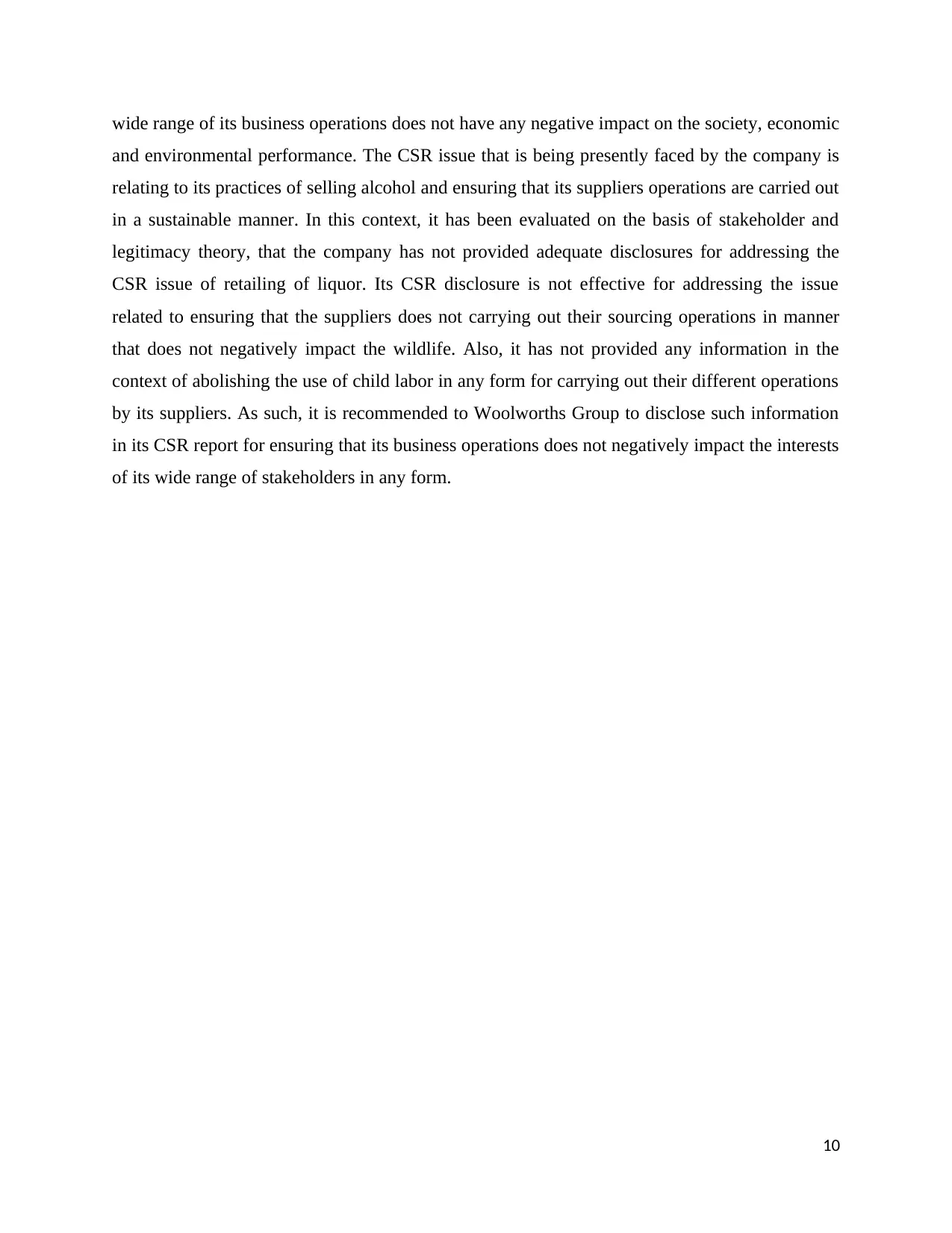
wide range of its business operations does not have any negative impact on the society, economic
and environmental performance. The CSR issue that is being presently faced by the company is
relating to its practices of selling alcohol and ensuring that its suppliers operations are carried out
in a sustainable manner. In this context, it has been evaluated on the basis of stakeholder and
legitimacy theory, that the company has not provided adequate disclosures for addressing the
CSR issue of retailing of liquor. Its CSR disclosure is not effective for addressing the issue
related to ensuring that the suppliers does not carrying out their sourcing operations in manner
that does not negatively impact the wildlife. Also, it has not provided any information in the
context of abolishing the use of child labor in any form for carrying out their different operations
by its suppliers. As such, it is recommended to Woolworths Group to disclose such information
in its CSR report for ensuring that its business operations does not negatively impact the interests
of its wide range of stakeholders in any form.
10
and environmental performance. The CSR issue that is being presently faced by the company is
relating to its practices of selling alcohol and ensuring that its suppliers operations are carried out
in a sustainable manner. In this context, it has been evaluated on the basis of stakeholder and
legitimacy theory, that the company has not provided adequate disclosures for addressing the
CSR issue of retailing of liquor. Its CSR disclosure is not effective for addressing the issue
related to ensuring that the suppliers does not carrying out their sourcing operations in manner
that does not negatively impact the wildlife. Also, it has not provided any information in the
context of abolishing the use of child labor in any form for carrying out their different operations
by its suppliers. As such, it is recommended to Woolworths Group to disclose such information
in its CSR report for ensuring that its business operations does not negatively impact the interests
of its wide range of stakeholders in any form.
10
Paraphrase This Document
Need a fresh take? Get an instant paraphrase of this document with our AI Paraphraser
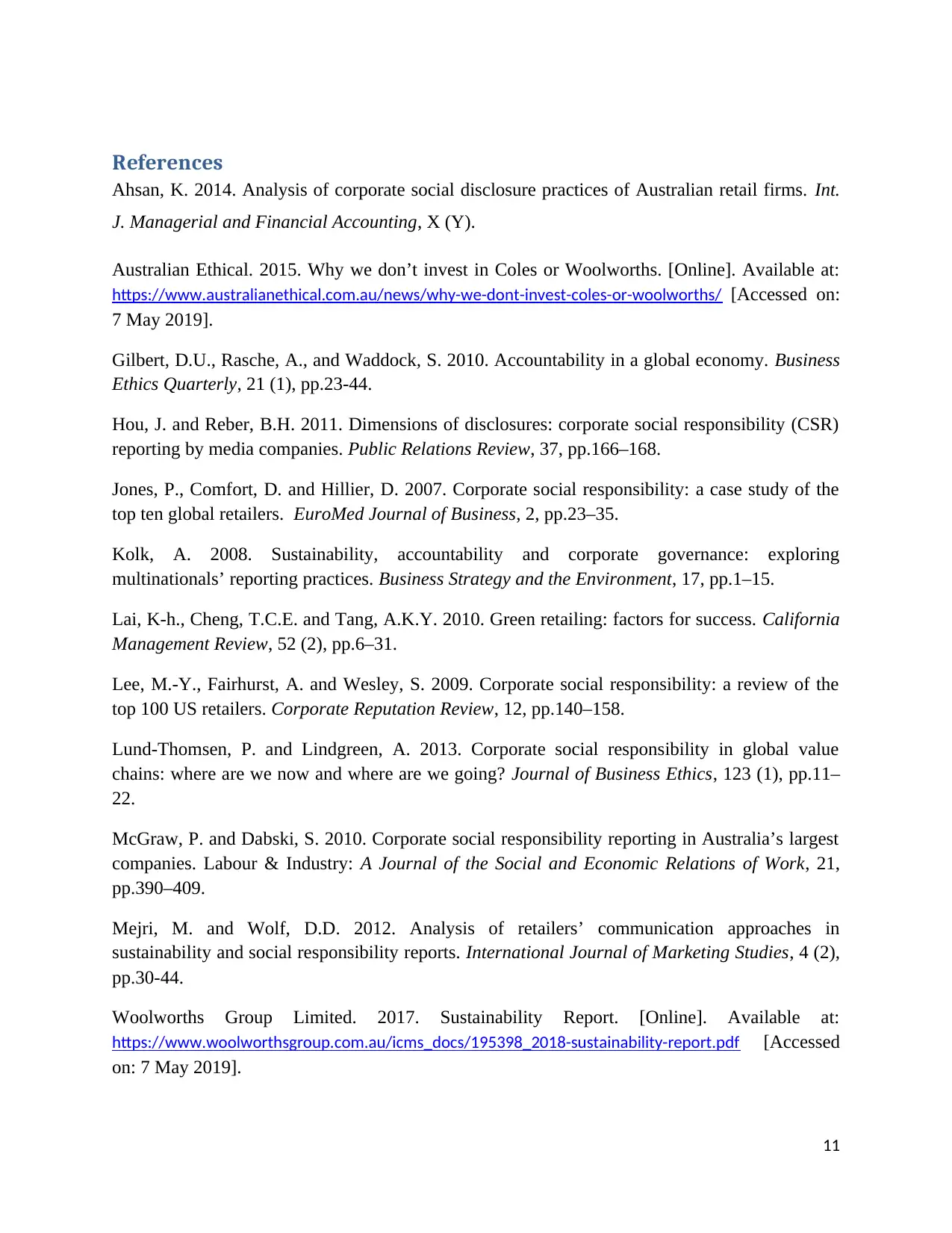
References
Ahsan, K. 2014. Analysis of corporate social disclosure practices of Australian retail firms. Int.
J. Managerial and Financial Accounting, X (Y).
Australian Ethical. 2015. Why we don’t invest in Coles or Woolworths. [Online]. Available at:
https://www.australianethical.com.au/news/why-we-dont-invest-coles-or-woolworths/ [Accessed on:
7 May 2019].
Gilbert, D.U., Rasche, A., and Waddock, S. 2010. Accountability in a global economy. Business
Ethics Quarterly, 21 (1), pp.23-44.
Hou, J. and Reber, B.H. 2011. Dimensions of disclosures: corporate social responsibility (CSR)
reporting by media companies. Public Relations Review, 37, pp.166–168.
Jones, P., Comfort, D. and Hillier, D. 2007. Corporate social responsibility: a case study of the
top ten global retailers. EuroMed Journal of Business, 2, pp.23–35.
Kolk, A. 2008. Sustainability, accountability and corporate governance: exploring
multinationals’ reporting practices. Business Strategy and the Environment, 17, pp.1–15.
Lai, K-h., Cheng, T.C.E. and Tang, A.K.Y. 2010. Green retailing: factors for success. California
Management Review, 52 (2), pp.6–31.
Lee, M.-Y., Fairhurst, A. and Wesley, S. 2009. Corporate social responsibility: a review of the
top 100 US retailers. Corporate Reputation Review, 12, pp.140–158.
Lund-Thomsen, P. and Lindgreen, A. 2013. Corporate social responsibility in global value
chains: where are we now and where are we going? Journal of Business Ethics, 123 (1), pp.11–
22.
McGraw, P. and Dabski, S. 2010. Corporate social responsibility reporting in Australia’s largest
companies. Labour & Industry: A Journal of the Social and Economic Relations of Work, 21,
pp.390–409.
Mejri, M. and Wolf, D.D. 2012. Analysis of retailers’ communication approaches in
sustainability and social responsibility reports. International Journal of Marketing Studies, 4 (2),
pp.30-44.
Woolworths Group Limited. 2017. Sustainability Report. [Online]. Available at:
https://www.woolworthsgroup.com.au/icms_docs/195398_2018-sustainability-report.pdf [Accessed
on: 7 May 2019].
11
Ahsan, K. 2014. Analysis of corporate social disclosure practices of Australian retail firms. Int.
J. Managerial and Financial Accounting, X (Y).
Australian Ethical. 2015. Why we don’t invest in Coles or Woolworths. [Online]. Available at:
https://www.australianethical.com.au/news/why-we-dont-invest-coles-or-woolworths/ [Accessed on:
7 May 2019].
Gilbert, D.U., Rasche, A., and Waddock, S. 2010. Accountability in a global economy. Business
Ethics Quarterly, 21 (1), pp.23-44.
Hou, J. and Reber, B.H. 2011. Dimensions of disclosures: corporate social responsibility (CSR)
reporting by media companies. Public Relations Review, 37, pp.166–168.
Jones, P., Comfort, D. and Hillier, D. 2007. Corporate social responsibility: a case study of the
top ten global retailers. EuroMed Journal of Business, 2, pp.23–35.
Kolk, A. 2008. Sustainability, accountability and corporate governance: exploring
multinationals’ reporting practices. Business Strategy and the Environment, 17, pp.1–15.
Lai, K-h., Cheng, T.C.E. and Tang, A.K.Y. 2010. Green retailing: factors for success. California
Management Review, 52 (2), pp.6–31.
Lee, M.-Y., Fairhurst, A. and Wesley, S. 2009. Corporate social responsibility: a review of the
top 100 US retailers. Corporate Reputation Review, 12, pp.140–158.
Lund-Thomsen, P. and Lindgreen, A. 2013. Corporate social responsibility in global value
chains: where are we now and where are we going? Journal of Business Ethics, 123 (1), pp.11–
22.
McGraw, P. and Dabski, S. 2010. Corporate social responsibility reporting in Australia’s largest
companies. Labour & Industry: A Journal of the Social and Economic Relations of Work, 21,
pp.390–409.
Mejri, M. and Wolf, D.D. 2012. Analysis of retailers’ communication approaches in
sustainability and social responsibility reports. International Journal of Marketing Studies, 4 (2),
pp.30-44.
Woolworths Group Limited. 2017. Sustainability Report. [Online]. Available at:
https://www.woolworthsgroup.com.au/icms_docs/195398_2018-sustainability-report.pdf [Accessed
on: 7 May 2019].
11
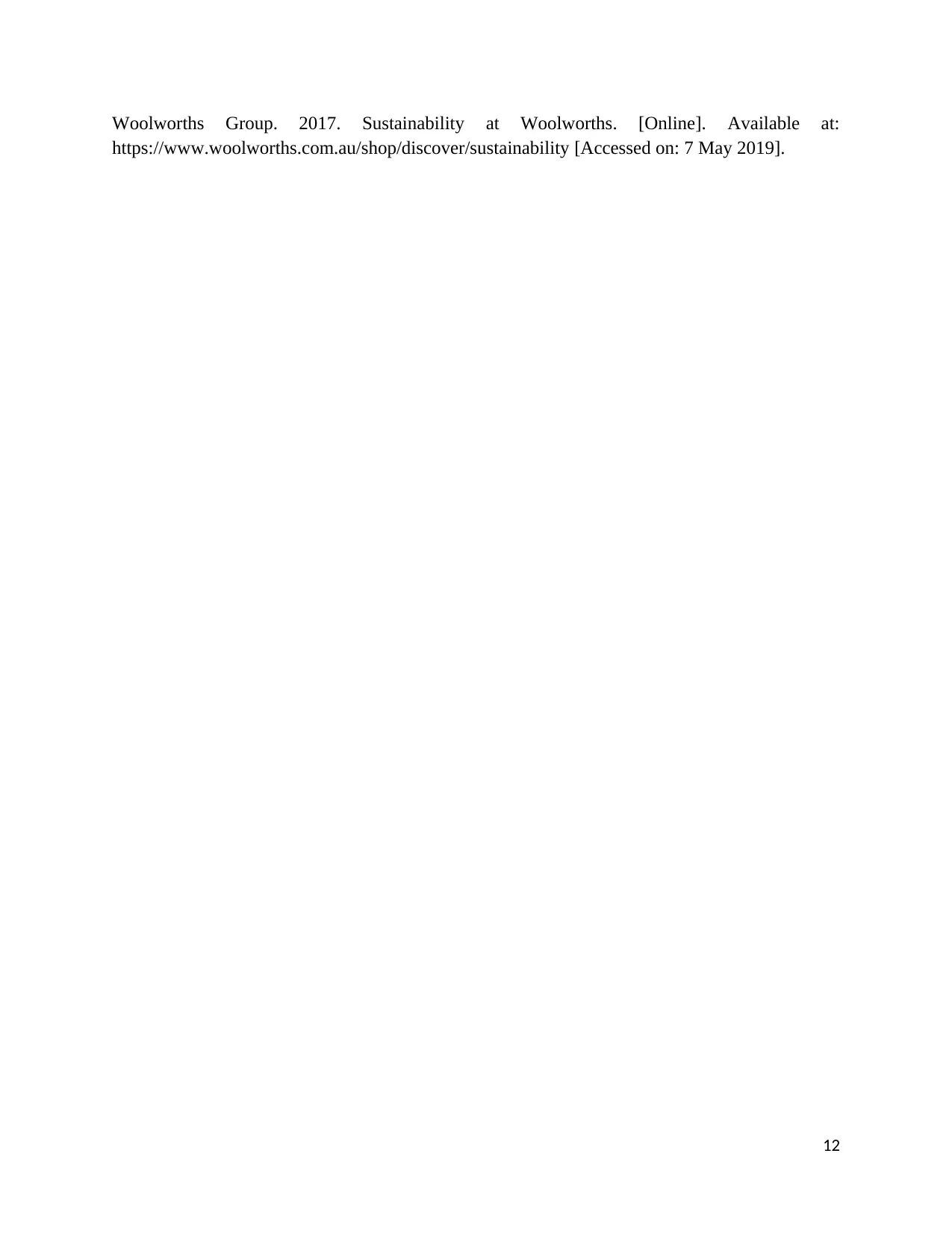
Woolworths Group. 2017. Sustainability at Woolworths. [Online]. Available at:
https://www.woolworths.com.au/shop/discover/sustainability [Accessed on: 7 May 2019].
12
https://www.woolworths.com.au/shop/discover/sustainability [Accessed on: 7 May 2019].
12
⊘ This is a preview!⊘
Do you want full access?
Subscribe today to unlock all pages.

Trusted by 1+ million students worldwide
1 out of 12
Related Documents
Your All-in-One AI-Powered Toolkit for Academic Success.
+13062052269
info@desklib.com
Available 24*7 on WhatsApp / Email
![[object Object]](/_next/static/media/star-bottom.7253800d.svg)
Unlock your academic potential
Copyright © 2020–2026 A2Z Services. All Rights Reserved. Developed and managed by ZUCOL.




